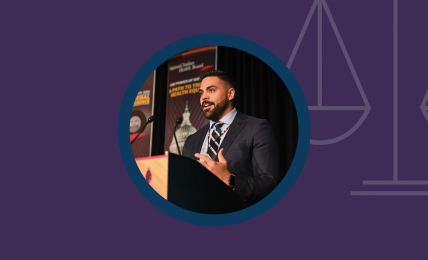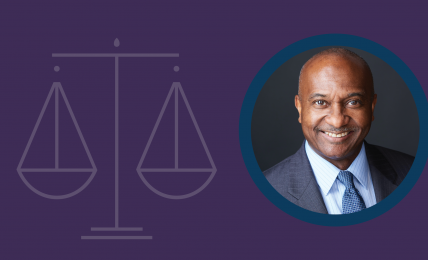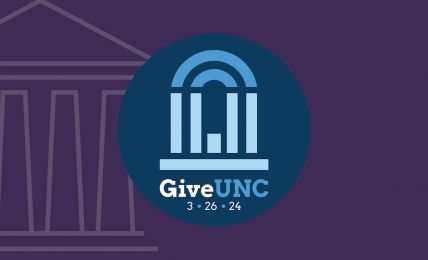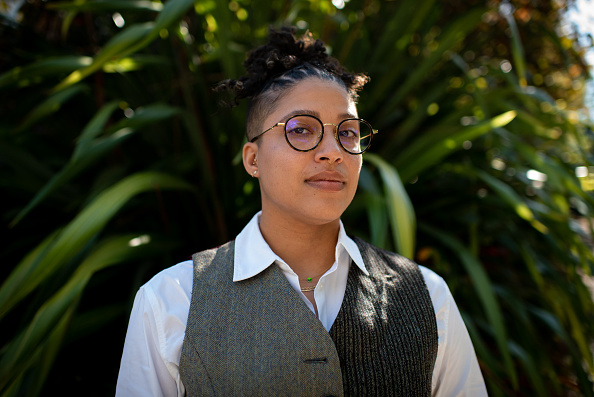
Photo credit: Marlena Sloss for The Washington Post via Getty Images
Anika Collier Navaroli’s expertise lies at the intersection of race, media, technology, law, and policy. She is currently is currently a Senior Fellow at the Tow Center for Digital Journalism at Columbia University. Before Columbia, Navaroli was a practitioner fellow in the Digital Civil Society Lab that is in partnership with the Center for Comparative Studies in Race and Ethnicity at Stanford PACS (Center on Philanthropy and Civil Society.) Prior to her fellowship at Stanford, Navaroli worked in senior content policy roles within the Trust & Safety departments at Twitter and Twitch where she re-examined the traditional balance between free expression and safety. Her previous work has included fighting on the front lines for systematic change in big data and internet freedom work at Color of Change, driving Data & Society Research Institute’s inquiries examining race, civil rights, and fairness within emerging technologies, and teaching the principles of law and constitutional freedoms to high school students in Harlem. In 2022, Navaroli gave evidence about her work as a former policy official on the team designing Twitter’s content-moderation rules to the U.S. Congressional Committee investigating the January 6 attack on the U.S. Capitol for which she received The Ridenhour Truth-Telling Prize. She holds a BS in journalism from the University of Florida, a MS from Columbia University Graduate School of Journalism where she wrote her 2013 thesis titled “The Revolution will be Tweeted,” and is a 2012 UNC School of Law graduate.
Q: You have spoken about an incident that happened to you when you were in middle school that started you on a path to understanding Americans’ rights of safety and free expression. What was that experience and how did that influence your plans to ultimately attend Carolina Law?
When I was in middle school, I had my first experience with racial terror. It wasn’t my first experience with racism, but it was my first time understanding how race and the American First Amendment seemed to be at odds.
After school one day, I was walking along the shopping mall sidewalk from the car to the entrance of Publix with my mother. And out of nowhere, a man in a confederate flag adorned pickup truck lunged off the road, past the parking spaces, and onto the sidewalk. He called my mother and I the n-word and told us to go back to where we had come from. I remember sensing this intense panic and I ran with my mother from the sidewalk and into a nearby shop. The people inside had seen what happened and offered to let my mom use the phone to call the police. When the police arrived, the man who attacked us had parked his car and gone grocery shopping. My mother and I explained what happened and the police told us that no crime had occurred because we hadn’t been physically harmed and that the First Amendment covered the man’s right to do what he did.
It made no sense to me. Someone had just literally tried to horrifically murder my mother and I, but I was being told that it was fine and it was somehow protected by the Constitution?
I think unconsciously at that point, I set out on this eternal mission to attempt to make sense of the laws that govern us, the society that is influenced by these laws, and the lived experiences that it creates for humans.
I’ll also say, when I relay this experience, it’s often shocking for some, but many others understand it all too well because it’s unfortunately not an uncommon experience for Black children who grow up in the American South. I think part of my work has been hoping to shape a world where no one else would have to experience what I did.

Q: What did Carolina Law instill in you that stayed with you throughout your legal journey?
I went to Carolina Law because the school was before its time in recognizing the importance of media law and technology policy. While at Carolina Law, I was really allowed to hone my intellectual passions and build a solid legal foundation while also pursuing a non-traditional career path.
I didn’t know exactly the type of career I wanted to have, but I knew that my pathway was unique and I was much more interested in doing practical policy work than traditional legal litigation. I am extremely grateful for the amazing career counselors, deans, and staff at Carolina Law who saw the spark in me, told me to keep going, and showed up in very tangible ways during my time in Chapel Hill.
Carolina Law also supported my dreams by allowing me to pursue them in depth intellectually. I was able to structure my formal class work to center on the subject matter I was most interested in and signed up for every class possible to gain a solid foundation in First Amendment jurisprudence.
I was also able to gain practical experience applying the law as a research assistant for professors and centers like the late, great Charles Daye and the Center for Civil Rights and David Ardia and the Center for Media Law and Policy.
Q: After you graduated from Carolina Law, you received a master’s degree from Columbia University where your thesis was titled “The Revolution will be Tweeted.” It was focused on how constitutional legal principles had expanded to social media. Explain your thoughts on the balance of free expression and safety.
I wrote my master’s thesis in 2013. At the time, we were experiencing this cataclysmic shift in the ways social media was being used to assert constitutional and human rights. This was the time of Occupy Wall Street in the United States and the Arab Spring around the world. This new technology had given people and movements a new method for promoting their free expression and amplifying their speech in ways never before seen. I was obsessed with understanding what was happening, how the law was going to catch up, and what policies were going to fill the gaps.
In the decade since, I’ve continued to seek answers to the same questions. And in that time, a common refrain from the technology industry that has emerged is about their need to balance free expression and safety. It’s the basis for all current content moderation.
I agree that people are entitled to the human rights of free expression and safety in a variety of forms including physically and psychologically. But I think the idea of “balancing” is much more complicated than adding and subtracting from each side to even the metaphorical scale.
I think this flat balancing act is detrimental and dangerous. Rather, I have encouraged people to think about speech through a multi-faceted lens. One of the dimensions that must be included is an understanding and analysis of the societal power dynamics into which a policy lands. Policy and law are not devoid from their impact on society, and the reverse is also true.
So with this in mind, I ask people to move from the traditional analysis of free expression versus safety to asking more nuanced questions like: Safety for whom? And free expression for whom? These simple questions and complex answers allow us to approach the immense task with better leverage.
Q: Since graduation, briefly describe your legal experience prior to joining the Twitter policy team in 2019.
What’s interesting about my career is that I’ve never actually had a job where a JD or bar admission was required. My jobs have always been the “JD preferred” or “JD a plus” ones. Yet, I’ve used my legal education almost every day in those roles.
After graduating from Columbia, I went and worked at a boutique law firm and in Big Law. I used both my legal and journalism background to do communications, public relations, marketing, and business development for the firms. While working at those firms, I was always hoping to find a job practicing policy at the intersection of media, technology, speech, and civil rights. But those jobs honestly didn’t exist at the time.
And then one day I saw a new job leading up work about big data and civil rights at a new research think tank. The job description said, “the right person for this job may have a master’s or JD.” I had both. And I used them both on a daily basis as I crafted work and research about emerging technologies. I then moved to a digital advocacy organization and began leading their work in similar areas.
Lastly, I had a brief stint as a high school teacher in Harlem where I taught everything from LSAT logic games and case briefing to the basics of constitutional law and how relevant current events interacted with legal precedent.
Q: In your professional capacity, what types of responsibilities do policy teams inside of social media companies tend to have?
Social media companies tend to actually have a few different types of policy teams or people, each with different policy specialties. Public policy teams tend to work more externally with civil society, advocacy groups, and government. Product policy teams tend to work internally with product managers, engineers, and other policy teams to determine safety implications of new product launches. Certain teams deal specifically with policies for advertisers or ways for users to monetize on the service. Other teams deal with bots and coordinated or sponsored campaigns.
My professional expertise is in what’s called content policy or safety policy within social media companies. These are the folks responsible for writing the rules or community guidelines that you see externally. Those rules set out what you can and cannot do on a platform. These include areas like abuse, harassment, hate speech, violence, privacy, and misinformation. They also write guidelines internally for how additional content moderators should interpret and apply their policy prohibitions. Finally, they often act as the final reviewers for high profile pieces of content or borderline content that no other content moderators can make a determination on.
It’s a big job. A powerful job. And one that I argue shouldn’t exist.
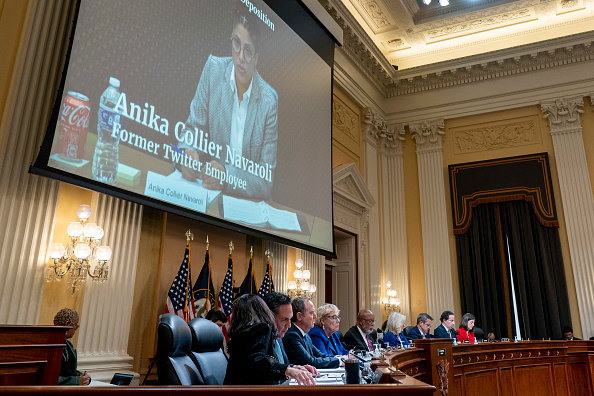
(Photo by Andrew Harnik-Pool/Getty Images)
Q: According to your testimony to the January 6 Committee, while at Twitter, you raised concerns that extremism and political disinformation was a threat to democracy and that people like Donald Trump weren’t held to the same rules as everyone else. You testified that you were worried that Twitter’s failure to act in the days leading up to Jan. 6 could lead to violence. You were right. How has your life changed since testifying before the committee?
It feels like my whole life has changed since testifying before the committee. I haven’t consistently been around this many lawyers since graduating from Carolina Law. And, I’ve had to become very in tune with myself and my intuition in order to guide me through situations that have pulled me in all directions.
But most importantly, I think, I’ve found a new pride in myself. There have been so many points along this journey where I’ve seen myself at a crossroad and had to ask myself, “when history looks back at this moment, who do you want to be?” It hasn’t been easy to rise to those answers. And I’m proud of who I’ve decided to be.
Q: In January 2022, you were researching the impact of hate-speech moderation through a fellowship at Stanford University. What have did you learn?
One major takeaway from my research is how little content moderation researchers have actually talked to people who have done the work of writing and enforcing content moderation policy. Many of the people I spoke with told me stories they said they had never shared with another person. They said it was because no one had ever asked them before.
It’s exceedingly clear to me that we need to hear more from the people who have actually done these jobs. They have the insights and lessons that are key to us understanding how these social media companies work and how we can ensure content moderation works to protect, not harm.
The other main takeaway comes from the last interview questions that I’ve asked everyone I’ve spoken with: “What would you tell your former self or any other Black person looking to start out in these jobs?” What was fascinating to me was the optimism that people had. No one said they wouldn’t do it again or told others to stay away, despite all the challenges. Rather, they encouraged themselves and others to come eagerly to the work because it is so vital.
Q: What is your hope for the future of the intersection of constitutional law and social media and how companies draw the lines around speech and privacy?
I hope that social media continues in its promise of bringing easy accessibility to the exercise of human rights for people all over the world. But I also think that we need to regulate how these companies operate and to do that, we need to understand how they operate by talking to those on the front lines of content moderation. I often think that the tasks set before the humans in these content moderation roles are near to impossible. Where exactly does one draw the line around speech and privacy in the midst of a work day that requires you to deal with a rise in mass political violence and multiple global crises?
I’d also like the future to include more recognition, gratitude, and resources for the people who have given their brains to doing their best to answer these questions. Doing the impossible on a daily basis to keep people safe is the stuff of superheroes. Defending the planet’s digital human rights should not be a thankless job. And it also shouldn’t be a reason for targeted abuse or harassment.
Q: What advice do you have for current and prospective law students about the legal journey they will be embarking on?
The most important thing that I like to tell people embarking on a legal journey is that the job or role that you are dreaming of doing may not actually exist yet. I wrote my master’s thesis about an entire field that hadn’t yet been created that I would later work in. So while we live in a world that is changing and innovating so rapidly, it often takes both the law and policy a little while to catch up. Believe in yourself and trust that the niche intersection you are obsessed with is going to become as big of a deal as you think that it is. Go get prepared with your studies, your research, and your practical experience so that you will be intellectually prepared to meet the moment when it arrives.
Anika Collier Navaroli is a writer, lawyer and researcher focused on the intersections of technology, media, policy, and human rights. She is currently a Senior Fellow at the Tow Center for Digital Journalism at Columbia University.

